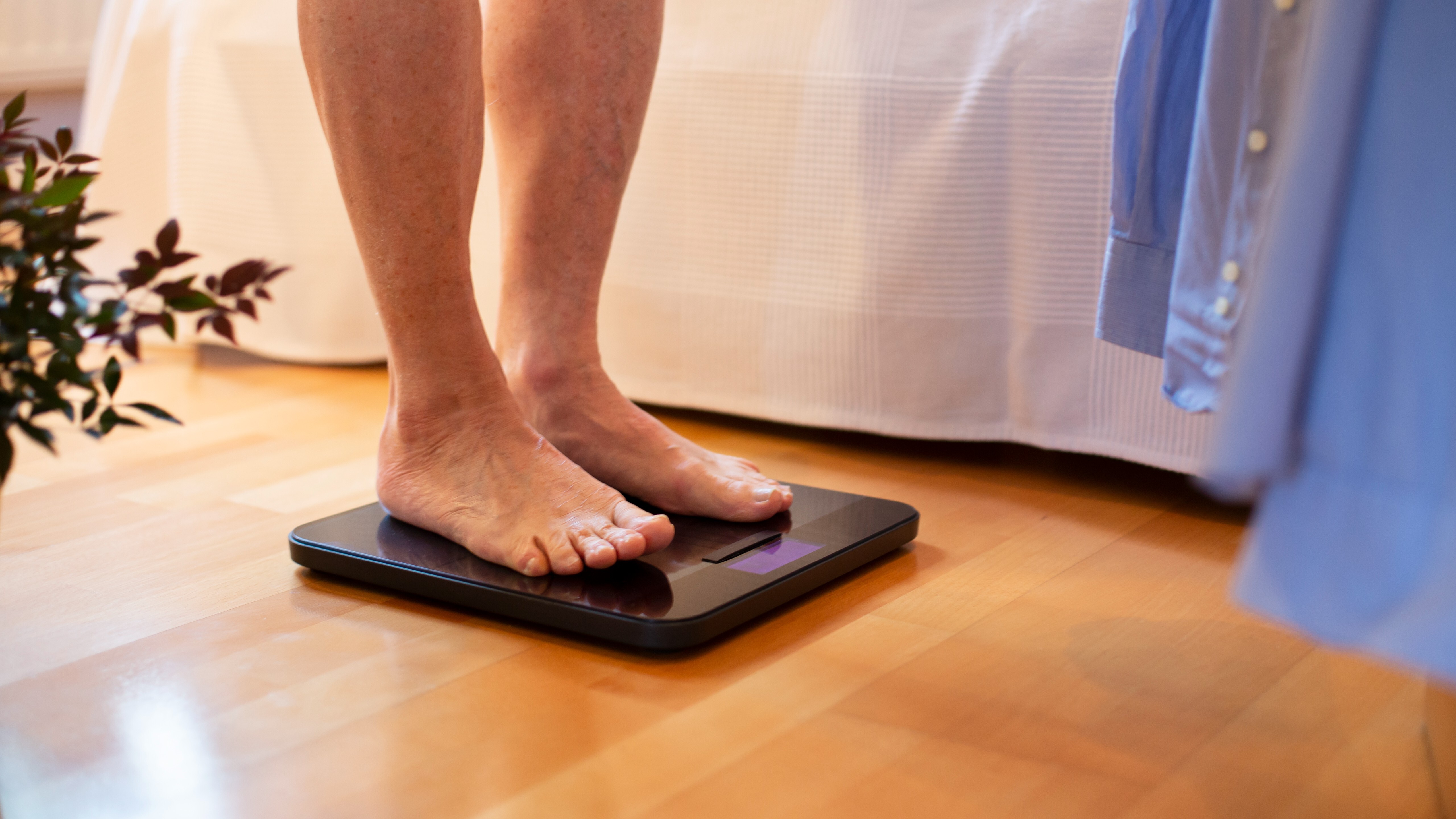Why does your weight fluctuate so much?
Wondering why does your weight fluctuate? We delved into the science and spoke to a registered dietician to unpack this topic

Becks Shepherd

Start your week with achievable workout ideas, health tips and wellbeing advice in your inbox.
You are now subscribed
Your newsletter sign-up was successful
Ever step on the scales and wonder why does your weight fluctuate so much? If you’re on a weight loss journey, these constant fluctuations in weight can make it hard to accurately track your progress.
Plus, it can also be deflating to see especially if you are sticking to a specific training program like using the best exercise machines to lose weight, or topping up your porridge or shakes with the best protein powders for weight loss, and not seeing the results you’d expect.
But that doesn’t mean you aren’t making progress. In fact, there could be a range of reasons behind this weight fluctuation other than fat gain. To help you make sense of these changes, we spoke to registered dietician and national spokesperson for the Academy of Nutrition and Dietetics, Theresa Gentile. She talked us through the changes in your body that can make your weight fluctuate. We also took a deep dive into the science to back up any claims.

Theresa Gentile, MS, RDN, CDN, Brooklyn, N.Y., is a National Media Spokesperson for the Academy of Nutrition and Dietetics. She is the coordinator of the home enteral nutrition program at Maimonides Medical Center and owns a nutrition consulting practice where she focuses on cardiac health and weight management by improving women's metabolisms. She previously served as an adjunct faculty
member at CUNY Brooklyn College and has earned the Distinguished Dietitian of the Year Award from the Greater New York Dietetic Association. Gentile earned undergraduate and master’s degrees from CUNY Brooklyn College.
Why does your weight fluctuate so much?
1. Your carb intake has been high
We want to preface this by saying: carbs aren’t the enemy here. In fact, as years and years worth of research dictates, carbs are a key component of healthy eating.
According to one journal published in the Advances in Nutrition: “The primary role of carbohydrates is to provide energy to all cells in the body and dietary fiber.” And as stated by the Dietary Guidelines for Americans, adults should consume 45–65% of their total calories from carbohydrates.
However, when it comes to weight fluctuations, a high carb intake can have a role to play.
As Gentile explains: “The body stores carbohydrates in the form of glycogen. Glycogen is made up of a protein core with 3-4 grams of water attached to it. So, if you eat a high carbohydrate meal, you may notice that water retention on the scale.”
Start your week with achievable workout ideas, health tips and wellbeing advice in your inbox.
2. You are dehydrated
How much water do you drink a day? According to current guidelines, two to three liters of water should be consumed a day. Although if you are exercising, you may need to drink more.
Not drinking enough liquids can lead to dehydration, poor brain function, affect our digestive health and cause our blood pressure to rise. And, according to Gentile a lack of liquids can also cause our weight to fluctuate slightly.
She says: “If you're not drinking enough water, your body may store extra, to prevent dehydration.”
3. You’ve consumed a lot of salt

Salt, aka sodium, causes the body to retain water. Gentile tells us: “If you suddenly eat foods with a high salt load, your thirst may increase, causing you to drink more water. Since your urine volume doesn't necessarily change, your body may temporarily hold onto the extra water volume.”
Removing such foods may cause a drop in scale weight but remember this is just a loss of water. The Dietary Guidelines for Americans recommend limiting intake of sodium to less than 2300mg per day, whilst British NHS guidelines state that we should be eating no more than 6g of salt a day; less than one teaspoon. Some ready meals alone can contain half this amount. So be salt aware and learn more about how to reduce your sodium intake.
4. Your weight fluctuates during your menstrual cycle
That feeling during period week is an uncomfortable one, and can result in all sorts of weight fluctuations.
Gentile explains: “Menstruation can cause fluid and salt retention, especially in the first few days of ovulation, which could show up on the scale.
“This is due to hormone fluctuations, which in turn, cause the kidneys to retain water and salt. This can also cause swelling, where a woman may see the scale fluctuate up to 4 pounds during menstruation.”
An increase in appetite often occurs during this stage too, which could lead to an excess of calories, which in turn can lead to an increase on the scales. However, over the course of a month this often evens out as appetite normalizes.

5. You haven’t pooped
Bowel movements are a big contributor to our weight. Naturally, when you’re constipated, or unable to poop, your body is holding on to more weight.
It’s often clear that your body is holding on to the weight, as bloating may occur, which can lead to considerable discomfort. In fact, a study published in medical publication GastroJournal found that the median daily stool weight was 106g for healthy UK adults. However, around the world, this weight varies from 72g per day to a staggering 470g per day.
Gentile adds: “The rate of your digestive system likely won't have a big part to play in day-to-day weight fluctuations, although depending on how much and how often you have a bowel movement, you may notice a difference on the scale after elimination.”
7. Alcohol has made you bloated
Alcohol is a diuretic, meaning it makes you wee more than usual as the body seeks to expel the toxins taken in. This can lead to weight loss.
And, as Gentile explains, alcohol also interferes with the mechanism that regulates the water levels in our body. She says: “Alcohol consumption decreases the amount of antidiuretic hormone (ADH) we make, so we make more urine and become a little dehydrated. Normally, if your body senses that you're dehydrated, the posterior pituitary pumps out ADH so that you don't urinate as much, thereby protecting your water supply.”
But, in most situations, alcohol is often consumed in combination with foods high in salt and dense in calories, which has the opposite effect – eventually leading to an upward movement on the scales. As mentioned previously, high salt intake can lead to weight fluctuations.
Want to limit the damage of alcohol? Alternate alcoholic drinks with water and try to keep salty, calorie-dense foods out of reach, so you’re not tempted to consume them.
Lucy is a freelance journalist specializing in health, fitness and lifestyle. She was previously the Health and Fitness Editor across various women's magazines, including Woman&Home, Woman and Woman’s Own as well as Editor of Feel Good You. She has also previously written for titles including Now, Look, Cosmopolitan, GQ, Red and The Sun.
She lives and breathes all things fitness; working out every morning with a mix of running, weights, boxing and long walks. Lucy is a Level 3 personal trainer and teaches classes at various London studios. Plus, she's pre- and post-natal trained and helps new mums get back into fitness after the birth of their baby. Lucy claims that good sleep, plenty of food and a healthy gut (seriously, it's an obsession) are the key to maintaining energy and exercising efficiently. Saying this, she's partial to many classes of champagne and tequila on the rocks whilst out with her friends.
